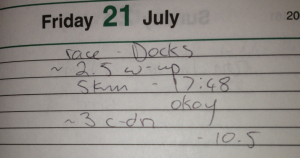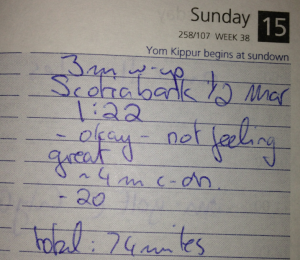Going public with my race goal
I want to see how fast I really can go if I train with one goal race in mind. So that's what I'm doing, and I’m going to do something different this time: I’m giving myself a goal time and I’m going to tell people what it is.

I go through varied phases in running where sometimes I need a racing goal and sometimes I don’t. I’ve just come out of a long phase of running with no specific racing goal in mind. As often happens, I just got the “racing bug” again and want to see how fast I really can go if I train with one goal race in mind. So that is what I am doing, and I’m going to do something different this time: I’m giving myself a goal-time and I’m going to tell people what it is.
For some reason, I haven’t often done this. It’s hard to state a goal – to yourself or publicly. It makes it real, and if it’s a hard goal, that can make it stressful. I could just train, and then show up at the start line and say “Well, I’ll just see what happens.” In fact I’ve done this a lot. But this gives my training a bit of a lack of specific purpose, not to mention, it’s hard to know whether or not I should be happy with my race result. For example, I came across a typical log entry from my training log from 2000:

Was I happy with that result? It’s hard to tell from my entry and I have no idea what I was aiming for.
Here’s one from 2002:

Again, I had no goal stated, so I had no idea whether or not to be satisfied with the result.
Fast-forward 13 years, and the wiser me knows that whether it’s in running, my career, my personal life or simply accomplishing daily tasks, I’m way more likely to succeed if I have a goal, write it down and tell it to others.
There are a few reasons for this:
1. Knowing your goal helps you to direct your energy. It’s possible to work extremely hard, but if it’s not moving you towards your goal it could be effort wasted.
2. Telling it to others gives people in your life the opportunity to help you towards your goals, or remove obstacles that might stand in your way. If friends and family know and support your running goals, they’re more likely to say “I’ll watch the kids while you get your run in” than “Come on, stay and have another beer.”
3. Once your goal is written down, you can’t constantly modify it on the fly or push it to an undefined time in the future. Yes, it brings on a bit of stress and nervous butterflies, but that’s how you improve.
4. You will know when you’ve achieved it. If you have, you can celebrate along with everyone who supported you along the way, and start looking forward to new challenges.
Now the toughest part: potential failure. What if you don’t reach your goal? And everyone knows? I think this is what has held me back from being specific about my goals in the past: fear of failure. It’s always a possibility. I think the best thing you can take from failure is to actually recognize that you didn’t reach your goal so that you can re-evaluate and refine either your process (such as adding more speedwork) or your goal itself (maybe it’s time to look at masters times rather than PBs when you were 20!).
The bottom line: If you’re a results-oriented person, having a specific goal, committing to it by sharing it with others and working towards it is a process which will lead you to improve – whether you attain it every time or not.
So here we go:
My goal race is the Scotiabank Toronto Waterfront Half-Marathon. My goal time is 1:21.
Wish me luck!


